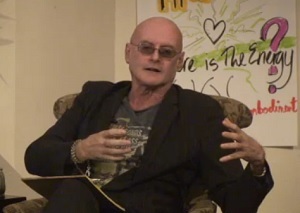|
TRANSLATE THIS ARTICLE
Integral World: Exploring Theories of Everything
An independent forum for a critical discussion of the integral philosophy of Ken Wilber
SEE MORE ESSAYS WRITTEN BY FRANK VISSER
Tadpoles
in Trouble
Ken Wilber on the
Process of Regeneration
Frank Visser
The religious overtones of this session are all too obvious here. Wilber's system has all the characteristics of a religious philosophy
A recent essay on Integral World by Jos Groot asked the question "Is Ken Wilber a Guru?" The answer to that question depends of course on one's definition of a guru. Not in the traditional sense of initiating disciples and asking them to wear certain cloths or perform rituals. But certainly if we follow Storr's definition of a guru quoted by Groot as "Gurus differ widely from each other in a variety of ways, but most claim the possession of special spiritual insight based on personal revelation. Gurus promise their followers new ways of self-development, new paths to salvation."
While the insights Ken Wilber presents to his students are perhaps more intellectual than spiritual, he does offer "new ways of self-development", and even "new paths to salvation" in the form of the approach of Integral Life Practice (ILP). No less than enlightenment in this life—both in its horizontal and its vertical form, which Wilber relates to spiritual states and stages— is promised. What makes Wilber different from most other gurus is his intellectual bent. He has devoted two dozen books on the intellectual legitimization of a spiritual approach to life. As I have demonstrated in several essays on this website, this scientific grounding is sometimes lacking in soundness.
In a recent two-hour talk for the Boulder-based Integral Living Room, Ken Wilber[1] touched on many topics central to his integral vision. Here are some reflections on the style and content of this video. The Integral Center is located in Boulder, Wilber's long-time hometown, and though the talk was filmed without a clear view of the audience, the impression one gets is one of an informal, close gathering of devoted integral students. Wilber gets a standing ovation when entering the room, accompanied by host Terry Patten, co-author of Integral Life Practice.
Slightly embarrassed perhaps, Wilber quickly pays back the compliment by telling his students—and now I am paraphrasing from the video—that they are the pinnacle of human evolution, nay, perhaps of the whole cosmos, because they have expressed interest in Wilber's integral philosophy, apparently in these quarters understood as the highest insight available. Of course, Wilber can substantiate this claim with his own theory, that human beings are the most developed organisms, and that the integral stage of human development follows on the current premodern, modern and postmodern stages. The fact that his students are interested in these ideas proves that they are not far from this integral stage, even though their understanding might still be mainly intellectual.
Logical as this may sound within the framework of integral theory, this sets the tone for a meeting that is very far removed from a theoretical investigation. The religious overtones of this session are all too obvious here. Wilber's system, modestly called "A Theory of Everything", has all the characteristics of a religious philosophy, full of its own acronyms and neologisms, which can only be understood by the initiated, or at least those who have thoroughly studied Wilbers voluminous works.
To the unprepared, the narcissism of this setting is palpable.
Somewhere in the middle of his presentation, Wilber comments that he would value dissent, or debate, within the integral community. He would even be "really worried" if such a dimension was lacking. "Where's the juice?!", he exclaims. That, however, seems a bit hypocritical, given that fact that a decade of criticism on Integral World has been ignored by Wilber. I won't repeat the discussion here, or the non-discussion, that Wilber is interested only in "good criticism", and doesn't respond to "bad criticism"—where he himself will decide which is which. Fact is, that much healthy dissent and debate has been exhibited on the pages of Integral World, and is still available for reflection, on these pages.
To impress his students that integral philosophy is now really getting off the ground, he claims that "hundreds" of articles on integral subjects are being or have been written, and "thousands" of people are studying it. And even "presidents and vice-presidents" (i.e. Clinton and Al Gore have favorably mentioned Wilber in public) have endorsed his views. One wonders if Obama is now also reading A Brief History of Everything, and if this is really the way to spread the integral message.
There's some exasperation or even desperation in Wilber's tone of voice: "What more can I do to convince you?"
To further encourage his students, he tells them that even their beginning reflections on integral philosophy will help bring on the Integral Age, for these thoughts will be stored in some Integral Repository, until it is so saturated with integrality that it will come down from the heavens. Or something to that effect. Wilber uses the Sheldrakean concept of morphogenetic fields (implying that things become easier when a first instance has occurred in the world; be it the solving of cross-word puzzles, the folding of protein molecules or the introduction of integral concepts) to makes this a plausible proposition.
Yeah, why not? For what do we actually know?
On Having Two Heads or Tails
Doesn't the DNA of every cell of an organism contain all the information relevant to building it?
In the course of his talk, Wilber briefly touches on science, when he uses the example of regeneration among tadpoles to "prove" that invisible fields like this govern all form.
In this context, he claims that when for example tadpoles are cut in two, the head will grow a new tail—and vice versa—again. How on earth is this possible? "There's nothing in their DNA!", Wilber exclaims. So, apparently, there must be an extra-physical cause for the regeneration they display. A morphogenetic field seems like a popular candidate for such a transcendental formative cause. (Never mind that the nature of these fields is left unspecified, as is the way they interact with the physical tadpoles to accomplish these marvelous facts of regeneration.)
One wonders if these tadpole-fields can also be cut in two halves, and how these would regenerate—but wait, they exist outside of space and time, so that would not be a problem... But seriously, using examples and claims like this to substantiate the theory that Eros rules evolution, fields govern the genesis of organic forms, and future cultural stages are triggered by thoughts, gathered in a heavenly repository, are really very far removed from science proper.
One feels the urge to shout "is there a biologist in the room!?"
Has Wilber never heard of the remarkable asset of amphibians to regenerate parts of their bodies, and how science has unraveled its molecular mechanisms? This has been studied for ages now. "There's nothing in their DNA?"—I beg your pardon? Doesn't the DNA of every cell of an organism contain all the information relevant to building it? The difference between a toe cell and a hair cell is not in the DNA it contains but in the toe- or hair-genes that are turned on or off in these respective body parts.
 Planarians: bilaterally symmetric metazoans
Planarians: bilaterally symmetric metazoans
with almost unlimited regenerative capacities
Again and again, Wilber shows his unfortunate talent for invoking dubious examples from the field of science to substantiate his own speculations. And always with an air of "I know this subject inside out". It happened with the subjects of evolutionary theory, the genesis of the heavy elements, and now with that of the biological regeneration of body parts. I Googled the topic and found a few interesting things I would like to share with you.
Says an M.I.T. website on neuroscience[2]:
Planarians are bilaterally symmetric metazoans that possess almost unlimited regenerative capacities and that have been a classic regeneration model for over a century. Planarians have cephalic ganglia (the brain), two ventral nerve cords, and many sensory neurons. All cells of the nervous system can be regenerated following injuries of myriad types, including complete decapitation. Therefore, robust mechanisms for production of new neuron types in the proper numbers and patterns exist. Planarian regeneration involves a population of adult pluripotent stem cells (the neoblasts), which become involved in the regeneration of the entire nervous system.
An overview article on the subject on regeneration in Planarians[3] gives us some quick and current facts from the world of real science. We learn here—and believe me, I had never even heard of these creatures—that not only can these poor little fellows be manipulated into re-growing a missing head, or tail, but even into growing "bipolar" heads or tails—having two heads and no tail, or two tails and no head! It's all a matter of chemical gradients, cascading pathways, stem cells and gene regulations, carefully tested in laboratories around the world.
Fact is indeed stranger than fiction.
The blooming scientific field of evo-devo abounds with examples of eyes growing in the weirdest parts of animal bodies due to cell transplants and manipulating the genetic toolkit. So far removed from the field-creates-form notions expressed by scientist-philosophers of the past such as Hans Driesch, who were looking for inner forces creating outer organic forms, especially during regeneration. Wilber seems to still be on that dead-end track. We never hear from him about these scientific advances.
Where does that leave Wilber's tadpole-fields but hanging in thin air?
As there is a palpable atmosphere surrounding Wilber's presence and presentation in the video, there's also a distinct atmosphere noticeable in these scientific journals. The difference is between cheap and suggestive, pseudo-scientific language on the one hand, and sober and painstaking research producing real results on the other—with lots of exiting new questions to investigate. For example: why are amphibians so expert at regeneration and does this capacity get progressively lost in the higher organisms such as us mammals?
Do I really care about tadpoles? Not in particular. But I do care about faithfully representing science to an integral audience, that relies too much on Wilber's reinterpretations, which are received with an attitude of awe and reverence—not really helpful in finding out about the facts of life.
Notes
[1] "A Conversation with Ken Wilber Live in The Integral Living Room on Livestream", http://new.livestream.com/integralcenter/events/2507065, November 1st, 2013.
[2] Planaria, http://web.mit.edu/neuro/planaria.html
[3] Elliot, S.A. & A.S. Alvarado, The history and enduring contributions of planarians to the study of animal regeneration, WIREs Dev Biol 2012. doi: 10.1002/wdev.82 (available from: www.researchgate.net)
Further Reading
Sunderland, Mary E., "Regeneration". Embryo Project Encyclopedia (2009-06-10). ISSN: 1940-5030 http://embryo.asu.edu/handle/10776/1681.
"Regeneration", Wikipedia, http://en.wikipedia.org/wiki/Regeneration_(biology)
|

 Frank Visser, graduated as a psychologist of culture and religion, founded IntegralWorld in 1997. He worked as production manager for various publishing houses and as service manager for various internet companies and lives in Amsterdam. Books: Ken Wilber: Thought as Passion (SUNY, 2003), and The Corona Conspiracy: Combatting Disinformation about the Coronavirus (Kindle, 2020).
Frank Visser, graduated as a psychologist of culture and religion, founded IntegralWorld in 1997. He worked as production manager for various publishing houses and as service manager for various internet companies and lives in Amsterdam. Books: Ken Wilber: Thought as Passion (SUNY, 2003), and The Corona Conspiracy: Combatting Disinformation about the Coronavirus (Kindle, 2020). 
